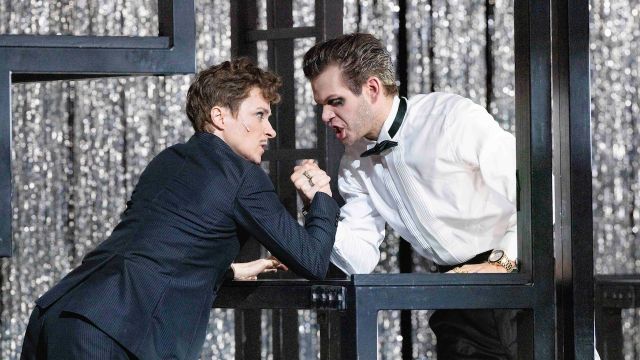The Threepenny Opera
“The Threepenny Opera is also always about the drama that happens in the theatre and the drama that we seem to so enjoy creating in our own lives too.” – Barrie Kosky on his production of The Threepenny Opera, one of the ‘big ticket items’ of the Adelaide Festival. Originally written to give the working class a voice, this production moves that concept to the 21st century and even includes audience participation!
The Threepenny Opera is Bertolt Brecht’s adaptation of The Beggar’s Opera into a new work that would serve as a political critique of capitalism and as a showcase for his novel approach to theatre. Much of The Threepenny Opera’s historical reputation rests on his experimentation and breaking “the fourth wall” between audience and performers—but the music of Kurt Weill was just as important in turning it into a triumph. It mixes elements of classical opera and jazz, and made Weill’s name.
Set in Victorian London, it portrays the tumultuous life of Macheath, an amoral bandit who marries Polly Peachum, the daughter of an unscrupulous entrepreneur. Because the marriage endangers his business, Mr Peachum wants to have Mac hanged.
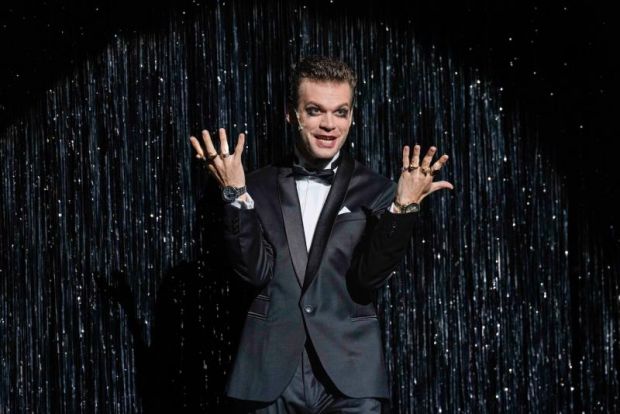
Director Barrie Kosky has taken this classic from German cabaret/opera and instead of recreating it as originally staged has decided to add/ subtract and push the style of performance towards slapstick. A risky gamble, but it pays off! Right from the opening of a silver jeweled head poking cheekily through a waterfall of silver glitter to the triumphant scene of Macheath escaping death, this production remains true to the original Brecht intent while being approachable to today’s audience.
Adam Benzwi’s seven-piece orchestra shared a myriad of instruments between them ranging from a banjo to a harmonium which gives the music its characteristic sound. Adding to the Kosky’s vision there is a lot of unexpected interplay between the musicians (in a raised pit) to enable the actors to talk to the performers, which gives this production another layer.
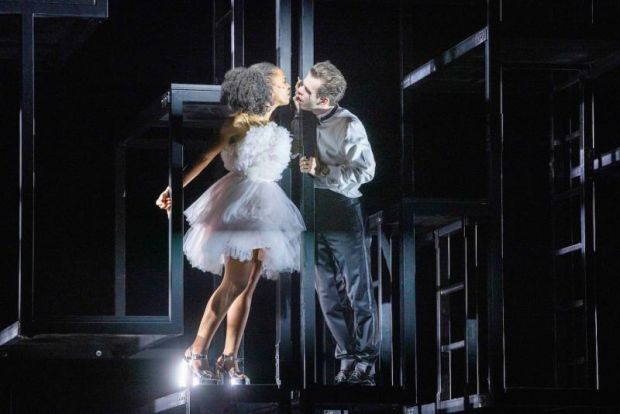
Towering ominously over the audience are Rebecca Ringst’s six monolithic towers, each filled with a complexity that reminds us of the backstreets of London or the innermost chambers of Macheath’s brain. These towers track up and down the stage in different configurations to focus our attention on the relationships between the characters.
The illusion is completed by Ulrich Eh’s moody lighting Holger Schwank’s sound and Dinah Ehm’s costumes that range from sinister black to glowing gold and the psychedelia of Lucy’s fringe dress.
The cast from the Berliner Ensemble (founded in 1949 by Brecht himself) have a real affinity for this production as they scale Ringst’s brooding monolithic set looking for their piece of the world.
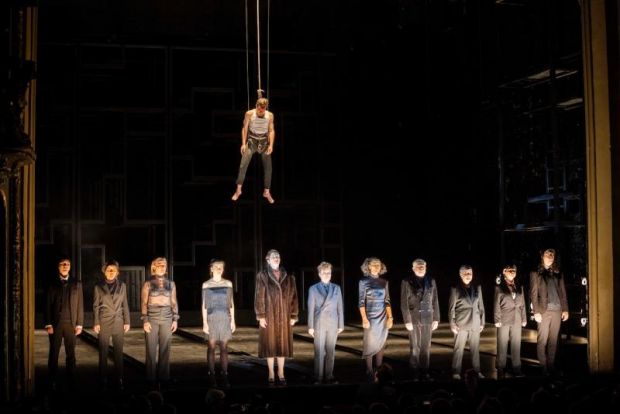
Tilo Nest and Constanze Becker as Jonathan Jeremiah Peachum and Celia Peachum make a conniving twosome driving the social comment. Their solo scenes in Act 2 are powerful as their costuming, Nest in a black velvet suit and Becker in a black fur coat with a questionable amount of clothing under it), heels and red lipstick, the ultimate ‘power’ couple.
Gabriel Schneider is the perfect Macheath (Mackie Messer and Filch). Lithe and athletic, he scales the heights of the set either pursuing his love or being chased for his crimes. He has a compelling voice and physicality that draws the audience to him, particularly as he literally soars over the cast at the end of the piece.
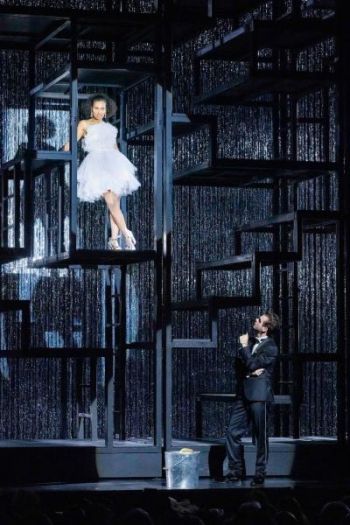
Cynthia Micas gives us a sweet, but worldly wise Polly Peachum and is vocally well matched to Schneider. I particularly enjoyed her duet with Lucy.
Kathrin Wehlisch’s chief of Police, Brown is Chaplin reborn. She possesses impeccable comic timing and slapstick physicality.
Laura Balzer’s Lucy is an audience favourite and takes visual humour to another level, particularly in her scene with Polly.
The Moon Over Soho Josefin Platt and its double played by Dennis Jankowiak and Heidrun Schug leer at us in silver makeup from the top of the set prepare us for what’s to come and have the last say.
Julia Berger’s Spelunkenenny is a sweet voice of reason in an otherwise corrupt world. The cast is completed by Dennis Jankowiak, Julie Wolff, Teresa Scherhag and Nicky Wuchinger as Macheath's Men, Street Bandits and Prostitutes.
Barrie Kosky’s The Threepenny Opera is a grand vision that proves that humor can transcend language, time, and race. Brecht would be proud!
Barry Hill OAM
Photographer: Moritz Haase
Click here to check out our other Adelaide Festival 2024 reviews.
Subscribe to our E-Newsletter, buy our latest print edition or find a Performing Arts book at Book Nook.

